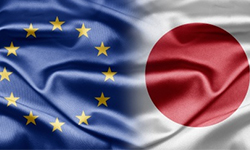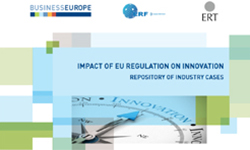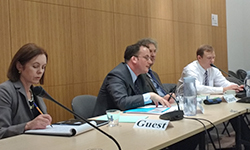BusinessEurope Headlines No. 2016-42
B20 Statement for Open Markets and Inclusive Growth
 The business community in G20 economies is strongly concerned about the rise in protectionism around the world and the increasing opposition to trade. These concerns cannot be simply dismissed but Governments must not resort to quick-fix solutions resulting in increased barriers to trade and investment. As Chair of the B20 Trade and Investment Task Force President Marcegaglia is specially committed to ensure that trade remains a tool to promote prosperity and better leaving conditions for citizens around the world.
The business community in G20 economies is strongly concerned about the rise in protectionism around the world and the increasing opposition to trade. These concerns cannot be simply dismissed but Governments must not resort to quick-fix solutions resulting in increased barriers to trade and investment. As Chair of the B20 Trade and Investment Task Force President Marcegaglia is specially committed to ensure that trade remains a tool to promote prosperity and better leaving conditions for citizens around the world.
![]() Contact: Luisa Santos
Contact: Luisa Santos
Digital transformation: challenges and opportunities for businesses and governments
 “Digital transformation is no longer an option but a necessity for companies of all kinds of business”. During a panel debate co-organised by GE and BusinessEurope on 12 December in Brussels, Markus J. Beyrer highlighted how one of the fundamental pillars of the digitalisation in Europe will be the development of our data economy. “The regulatory choices Europe will take in the coming months will be decisive for its success or failure”, added Beyrer. While data ownership issues do not seem to require legislative intervention for the time being, BusinessEurope sees the need for resolute EU action in order to ban existing and future data localisation requirements that can harm the single market.
“Digital transformation is no longer an option but a necessity for companies of all kinds of business”. During a panel debate co-organised by GE and BusinessEurope on 12 December in Brussels, Markus J. Beyrer highlighted how one of the fundamental pillars of the digitalisation in Europe will be the development of our data economy. “The regulatory choices Europe will take in the coming months will be decisive for its success or failure”, added Beyrer. While data ownership issues do not seem to require legislative intervention for the time being, BusinessEurope sees the need for resolute EU action in order to ban existing and future data localisation requirements that can harm the single market.
![]() Contact: Guido Lobrano
Contact: Guido Lobrano
EU-Export Controls* - striking the right balance
 “The EU needs to develop a modern Export Controls regime, able to respond to today’s challenges – namely increased competition at global level and addressing cyber-security concerns. Keeping this in mind, legislators should strike the right balance between trade and security policy objectives,” argued BusinessEurope International Relations Director Luisa Santos, at the EU Export Controls Forum 2016 held on 12 December in Brussels. In its proposal to update the EU Export Controls Regulation, the European Commission undertook a new “human security approach”, which introduces human rights criteria and de facto expands the scope of the Regulation to cyber-surveillance technology. BusinessEurope is concerned by the lack of clarity of certain concepts and definitions, which could impact the implementation of the regulation. For instance, unclear due diligence obligations may lead to increased administrative burden and costs for European companies, while at the same time, member states competent authorities might face increased requests for licenses. More guidance should be offered by the European Commission, in close consultation with stakeholders involved in dual-use trade. In parallel, the EU should enhance its outreach efforts towards our international trading partners, in order to ensure a level playing field for European companies. The legislative process for the modernisation of the EU regime has just started and BusinessEurope will remain actively involved.
“The EU needs to develop a modern Export Controls regime, able to respond to today’s challenges – namely increased competition at global level and addressing cyber-security concerns. Keeping this in mind, legislators should strike the right balance between trade and security policy objectives,” argued BusinessEurope International Relations Director Luisa Santos, at the EU Export Controls Forum 2016 held on 12 December in Brussels. In its proposal to update the EU Export Controls Regulation, the European Commission undertook a new “human security approach”, which introduces human rights criteria and de facto expands the scope of the Regulation to cyber-surveillance technology. BusinessEurope is concerned by the lack of clarity of certain concepts and definitions, which could impact the implementation of the regulation. For instance, unclear due diligence obligations may lead to increased administrative burden and costs for European companies, while at the same time, member states competent authorities might face increased requests for licenses. More guidance should be offered by the European Commission, in close consultation with stakeholders involved in dual-use trade. In parallel, the EU should enhance its outreach efforts towards our international trading partners, in order to ensure a level playing field for European companies. The legislative process for the modernisation of the EU regime has just started and BusinessEurope will remain actively involved.
*Export controls are applied on dual-use items, which can be used both for civilian and military purposes. They are often high-tech products, representing sectors such as IT, chemicals, and infrastructure.
Contact: Sofia Bournou
Business priorities in a ‘post-truth’ society
 We are approaching the end of a challenging year. Terrorism, migration or political instability near our borders have contributed to generating a sense of fear in our citizens, giving rise to populism or anti-trade feelings. Closing borders and becoming inward looking is not the solution. “Business cannot replace politicians. Our main task is to invest, create jobs and innovate. But we can remind politicians of their duty to develop policies that promote a more sustainable and competitive business environment in Europe,“ said Markus J. Beyrer during a breakfast meeting organised by the Confederation of Norwegian Enterprise in Oslo on 13 December. He was joined by State Secretary of the Norwegian ministry of Foreign Affairs Elsbeth Tronstad.
We are approaching the end of a challenging year. Terrorism, migration or political instability near our borders have contributed to generating a sense of fear in our citizens, giving rise to populism or anti-trade feelings. Closing borders and becoming inward looking is not the solution. “Business cannot replace politicians. Our main task is to invest, create jobs and innovate. But we can remind politicians of their duty to develop policies that promote a more sustainable and competitive business environment in Europe,“ said Markus J. Beyrer during a breakfast meeting organised by the Confederation of Norwegian Enterprise in Oslo on 13 December. He was joined by State Secretary of the Norwegian ministry of Foreign Affairs Elsbeth Tronstad.
Contact: Luisa Santos
The right regulatory cooperation between the EU and Japan is essential
 “Proactively creating common ground is a priority”, reads the joint statement on regulatory cooperation between BusinessEurope and Keidanren. Regulatory coherence, harmonization, and mutual recognition of standards and regulations are ways to improve market access and reduce the costs of trade. The EU and Japan account for more than a third of the world’s GDP and Japan is the EU’s second largest trading partner in Asia after China. The right approach to regulatory cooperation could therefore lead to substantial economic gains. BusinessEurope Director General Markus J. Beyrer said: “We have on a number of occasions called for a strong mechanism in the EU-Japan FTA which establishes an on-going dialogue between EU and Japanese regulators to ensure that policy requirements do not unintentionally generate new barriers to trade. We hope that this joint statement can offer valuable insights from industry on the types of issues it seeks to address and how this can best be done.”
“Proactively creating common ground is a priority”, reads the joint statement on regulatory cooperation between BusinessEurope and Keidanren. Regulatory coherence, harmonization, and mutual recognition of standards and regulations are ways to improve market access and reduce the costs of trade. The EU and Japan account for more than a third of the world’s GDP and Japan is the EU’s second largest trading partner in Asia after China. The right approach to regulatory cooperation could therefore lead to substantial economic gains. BusinessEurope Director General Markus J. Beyrer said: “We have on a number of occasions called for a strong mechanism in the EU-Japan FTA which establishes an on-going dialogue between EU and Japanese regulators to ensure that policy requirements do not unintentionally generate new barriers to trade. We hope that this joint statement can offer valuable insights from industry on the types of issues it seeks to address and how this can best be done.”
![]() Contact: Maurice Fermont
Contact: Maurice Fermont
The impact of EU regulation on innovation
 While well-drafted legislation can stimulate innovation, poorly designed legislation can stifle it. BusinessEurope, the European Round Table of Industrialists and the European Risk Forum published a collection of industry cases from a wide range of sectors, where regulation impacts innovation. The document aims to draw attention to the need for a more innovation friendly regulatory environment and to promote an informed dialogue between policymakers, industry and other stakeholders. The document is available here.
While well-drafted legislation can stimulate innovation, poorly designed legislation can stifle it. BusinessEurope, the European Round Table of Industrialists and the European Risk Forum published a collection of industry cases from a wide range of sectors, where regulation impacts innovation. The document aims to draw attention to the need for a more innovation friendly regulatory environment and to promote an informed dialogue between policymakers, industry and other stakeholders. The document is available here.
![]() Contact: Valentina Spina
Contact: Valentina Spina
The workplace of the future: how can we get the right skills?
 “Apprenticeships in digital and technical-based jobs can be very efficient to acquire valuable skills in the context of the workplace of the future”, said BusinessEurope Director for Entrepreneurship and SMEs Daniel Cloquet during a discussion at the “Generations Club” of the European Confederation of Junior Enterprises, JADE, on 9 December. “BusinessEurope supports the creation of national digital skills coalitions connecting public authorities, business, education, training and labour market stakeholders”, he added. JADE organised a cross-generational exchange on the skills needed for the workplace of the future and how to develop them. The discussion confirmed that having a good blend of professional skills, efficient attitudes and “learning by doing” experience, as practiced in the JADE training model, is key.
“Apprenticeships in digital and technical-based jobs can be very efficient to acquire valuable skills in the context of the workplace of the future”, said BusinessEurope Director for Entrepreneurship and SMEs Daniel Cloquet during a discussion at the “Generations Club” of the European Confederation of Junior Enterprises, JADE, on 9 December. “BusinessEurope supports the creation of national digital skills coalitions connecting public authorities, business, education, training and labour market stakeholders”, he added. JADE organised a cross-generational exchange on the skills needed for the workplace of the future and how to develop them. The discussion confirmed that having a good blend of professional skills, efficient attitudes and “learning by doing” experience, as practiced in the JADE training model, is key.
Contact: Daniel Cloquet
VAT Group discusses E-Commerce & VAT with the Commission
 Following the European Commission's recent proposals on e-commerce & VAT, BusinessEurope's VAT Group were pleased to welcome David O' Sullivan, Ludwig De Winter and Niam Carmody - officials from the Commission's Directorate-General for Taxation and Customs Unions - at its meeting on 8 December. They gave an explanation of the Commission’s recent proposal in this area, as well as answering questions from the group. As many e-commerce businesses still struggle with numerous VAT obstacles when expanding their markets, the VAT Group voiced its support for the Commission's efforts to remove these obstacles, particularly through proposals to extend the One Stop Shop and ensure a level-playing field. The VAT Group are now working on a full position paper for publication in the new year.
Following the European Commission's recent proposals on e-commerce & VAT, BusinessEurope's VAT Group were pleased to welcome David O' Sullivan, Ludwig De Winter and Niam Carmody - officials from the Commission's Directorate-General for Taxation and Customs Unions - at its meeting on 8 December. They gave an explanation of the Commission’s recent proposal in this area, as well as answering questions from the group. As many e-commerce businesses still struggle with numerous VAT obstacles when expanding their markets, the VAT Group voiced its support for the Commission's efforts to remove these obstacles, particularly through proposals to extend the One Stop Shop and ensure a level-playing field. The VAT Group are now working on a full position paper for publication in the new year.
Contact: Pieter Baert
Challenges and opportunities of the collaborative economy
 The collaborative economy can offer new opportunities for innovative business models and prompt competition in traditional markets. BusinessEurope Deputy Director Guido Lobrano stressed this at a meeting with French MEP Anne Sander on 8 December, as they discussed the drafting of the European Parliament report on the collaborative economy. The challenges of securing a level playing field compared to more traditional sectors, in relation to application of social security and taxation and employment rules were also addressed. The EU must have a careful approach to legislation and avoid fragmentation at a national or local level, if we want to realise the sharing economy’s huge potential for innovation and growth;
The collaborative economy can offer new opportunities for innovative business models and prompt competition in traditional markets. BusinessEurope Deputy Director Guido Lobrano stressed this at a meeting with French MEP Anne Sander on 8 December, as they discussed the drafting of the European Parliament report on the collaborative economy. The challenges of securing a level playing field compared to more traditional sectors, in relation to application of social security and taxation and employment rules were also addressed. The EU must have a careful approach to legislation and avoid fragmentation at a national or local level, if we want to realise the sharing economy’s huge potential for innovation and growth;
Contact: Guido Lobrano
Calendar
 15 December 2016: European Council
15 December 2016: European Council- 19 December 2016: ENVI council
- Season’s greetings & we will be back in the new year!